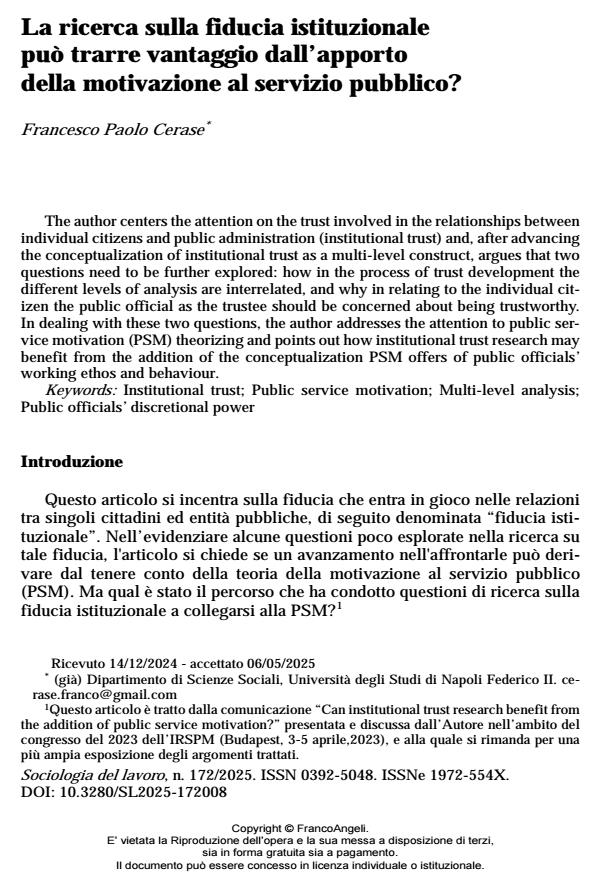La ricerca sulla fiducia istituzionale può trarre vantaggio dall’apporto della motivazione al servizio pubblico?
Titolo Rivista SOCIOLOGIA DEL LAVORO
Autori/Curatori Francesco Paolo Cerase
Anno di pubblicazione 2025 Fascicolo 2025/172
Lingua Italiano Numero pagine 20 P. 167-186 Dimensione file 233 KB
DOI 10.3280/SL2025-172008
Il DOI è il codice a barre della proprietà intellettuale: per saperne di più
clicca qui
Qui sotto puoi vedere in anteprima la prima pagina di questo articolo.
Se questo articolo ti interessa, lo puoi acquistare (e scaricare in formato pdf) seguendo le facili indicazioni per acquistare il download credit. Acquista Download Credits per scaricare questo Articolo in formato PDF

FrancoAngeli è membro della Publishers International Linking Association, Inc (PILA), associazione indipendente e non profit per facilitare (attraverso i servizi tecnologici implementati da CrossRef.org) l’accesso degli studiosi ai contenuti digitali nelle pubblicazioni professionali e scientifiche.
L’autore incentra l’attenzione sulla fiducia richiesta nelle relazioni tra cittadini e la pubblica amministrazione in tutte le sue articolazioni (fiducia istituzionale), e, sulla base della concettualizzazione della fiducia istituzionale come un costrutto multi-livello, argomenta che due questioni meritano ulteriore attenzione: in che modo nel processo di sviluppo della fiducia i diversi livelli sono interrelati tra di loro, e sulla base di quali elementi si può sostenere che nella relazione al cittadino un pubblico ufficiale in quanto fiduciario ha interesse a essere affidabile. L’autore affronta queste due questioni e esplora in che modo un contributo alla loro risposta può essere fornito dalla considerazione della motivazione per il servizio/lavoro pubblico che può caratterizzare l’ethos e il comportamento lavorativo del pubblico ufficiale.
Parole chiave:fiducia istituzionale; motivazione per il servizio/lavoro pubblico; analisi multi-livello; potere discrezionale del pubblico ufficiale
Francesco Paolo Cerase, La ricerca sulla fiducia istituzionale può trarre vantaggio dall’apporto della motivazione al servizio pubblico? in "SOCIOLOGIA DEL LAVORO " 172/2025, pp 167-186, DOI: 10.3280/SL2025-172008